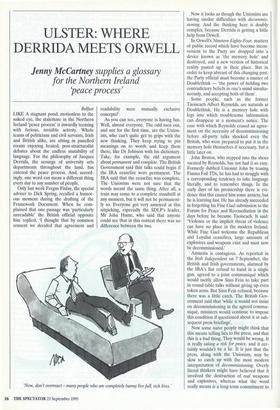ULSTER: WHERE DERRIDA MEETS ORWELL
Jenny McCartney supplies a glossary
for the Northern Ireland peace process'
Belfast LIKE A stagnant pond, motionless to the naked eye, the stalemate in the Northern Ireland 'peace process' is inwardly teeming with furious, invisible activity. Whole teams of politicians and civil servants, Irish and British alike, are sitting in panelled rooms enjoying heated, post-structuralist debates about the endless mutability of language. For the philosophy of Jacques Derrida, the scourge of university arts departments throughout the land, has entered the peace process. And, accord- ingly, one word can mean a different thing every day to any number of people.
Only last week Fergus Finlay, the special adviser to Dick Spring, recalled a humor- ous moment during the drafting of the Framework Document. When he com- plained that one passage was 'particularly unreadable' the British official opposite him replied, 'I thought that by common consent we decided that agreement and readability were mutually exclusive concepts!'
As you can see, everyone is having fun. Well, almost everyone. The odd men out, and not for the first time, are the Union- ists, who can't quite get to grips with the new thinking. They keep trying to pin meanings on to words and keep them there, like Dr Johnson with his dictionary. Take, for example, the old argument about permanent and complete. The British Government said that talks could begin if the IRA ceasefire were permanent. The IRA said that the ceasefire was complete. The Unionists were not sure that the words meant the same thing. After all, a train may come to a complete standstill at any moment, but it will not be permanent- ly so. Everyone got very annoyed at this nitpicking, especially the SDLP's leader, Mr John Hume, who said that anyone could see that in this context there was no difference between the two.
`Now, don't overreact - many people who are completely barmy live full, rich lives.' Now it looks as though the Unionists are having similar difficulties with decommis- sioning. And the thinking here is doubly complex, because Derrida is getting a little help from Orwell.
In Orwell's Nineteen Eighty-Four, matters of public record which have become incon- venient to the Party are dropped into a device known as 'the memory hole' and destroyed, and a new version of 'historical reality pasted up in their place. But in order to keep abreast of this changing past, the Party official must become a master of Doublethink — 'the power of holding two contradictory beliefs in one's mind simulta- neously, and accepting both of them'.
Some people, such as the former Taoiseach Albert Reynolds, are naturals at Doublethink. He is a memory hole with legs into which troublesome information can disappear at a moment's notice. The ease with which Reynolds erased an agree- ment on the necessity of decommissioning before all-party talks shocked even the British, who were prepared to put it in the memory hole themselves if necessary, but a little later on.
John Bruton, who stepped into the shoes vacated by Reynolds, has not had it so easy.
Formerly dubbed Unionist John by teasing Fianna Fail TDs, he has had to struggle with a corresponding tendency to take language literally, and to remember things. In the early days of his premiership there is evi- dence that this caused him some anxiety, but he is learning fast. He has already succeeded in forgetting his Fine Gael submission to the Forum for Peace and Reconciliation in the days before he became Taoiseach. It said: `Violence or the implicit threat of violence can have no place in the modern Ireland.
While Fine Gael welcome the Republican and Loyalist ceasefires, large amounts of explosives and weapons exist and must now be decommissioned.'
Amnesia is contagious. As reported in the Irish Independent on 7 September, the British and Irish governments, alarmed by the IRA's flat refusal to hand in a single gun, agreed to a joint communiqué which would tacitly allow Sinn Fein to take part in round-table talks without giving up even token arms. But Sinn Fein refused, because there was a little catch. The British Gov- ernment said that 'while it would not insist on decommissioning in the agreed commu- niqué, ministers would continue to impose this condition if questioned about it at sub- sequent press briefings'.
Now some naive people might think that this means telling lies to the press, and that this is a bad thing. They would be wrong. It is really taking a risk for peace, and it cer- tainly wouldn't be a lie. It is just that the press, along with the Unionists, may be slow to catch up with the most modern interpretation of decommissioning. Overly literal thinkers might have believed that it involved the destruction of real weapons and explosives, whereas what the word really means is a long-term commitment to take the gun out of Irish politics such as we have already heard coming from Gerry Adams. Just as progress has brought us the paperless office, so we can now have a weaponless decommissioning, without han- dling any guns at all: John Hume is fast becoming very cross with people who are too stupid to see this. He has been speaking on the radio at some length, attacking the verbalism which is getting in the way of the peace process. The verbalism in question is evidently in the form of unpleasant questions from the Unionists and the British, because when Mr Hume and the Irish government speak it is usually constructive dialogue.
And with the recent election of David Trimble as leader of the Unionist Party, the verbalism will be getting worse. Unlike Mr Molyneaux, who could never be accused of loquacity, Mr Trimble has been known to make statements about what his party wants. This is a very dangerous trait in a Unionist leader, and is already being cited in London and Dublin as a threat to a peace process which is dependent on doing what the Unionist Party doesn't want.
The most likely resolution to the current crisis in the peace process is the British Government's open abandonment of the third principle which Sir Patrick Mayhew set out in Washington in March. The third principle is the only one which says that the IRA should hand over some real arms. With that out of the way, an International Commission can get on with the job of moving the IRA to show a willingness in principle to disarm progressively, a phrase which is as full of fudge as a church fête. Then, while everyone else is chewing on interpretations, the Government, backed by the Clinton administration, can push the Unionists to join all-party talks or else take the rap for wrecking the peace.
But it might not all be plain sailing. In America last week, Gerry Adams called for the British to make disarmament an objective, as opposed to an obstacle. This sounds very reasonable. If, for example, I am robbing a bank, the fact that I am hold- ing a gun will not be any obstacle at all in my negotiations with the tellers. In fact, it may even help us considerably in having free and frank discussions.
You see, democracy can be rather dull, especially if, like Sinn Fein, you have no MPs and only 10 per cent of the vote. And after a while people stop giving you special marks for being good. So it's just as well to go back to Dr Johnson sometimes and remember that a gun is a gun, and it fright- ens other people into doing what you want. And if the British don't agree to be persuaders instead of facilitators for a Unit- ed Ireland, and the Unionists don't see sense, then the peace process might stop moving forward and start slipping back- wards. If that happens, it's very useful to remind them that you have something stronger than votes behind you — just in case they forget.



































































 Previous page
Previous page